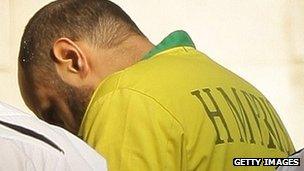BBC in court bid to interview terror suspect
- Published

Mr Ahmad was arrested in 2004
The BBC and one of its reporters has launched a court challenge to the justice secretary's decision not to allow a face-to-face interview with a terror suspect.
The corporation wants to speak to Babar Ahmad, 38, who has been detained for more than seven years without trial.
The British Muslim denies terror-related charges and is fighting extradition to the US.
He is being held in a special detainee unit in Worcestershire.
Justice Secretary Ken Clarke's decision to refuse the BBC permission to interview Mr Ahmad was challenged at the High Court in London by the corporation and home affairs correspondent Dominic Casciani.
Lord Pannick QC for the BBC told the court that the Ministry of Justice had initially granted permission to meet Mr Ahmad in Long Lartin prison but then withdrew the offer after the corporation argued the interview should be filmed.
He added that Mr Clarke's decision unlawfully infringed the BBC's freedom of speech under the European Convention on Human Rights and the decision to block an interview failed to take into account the exceptionally unusual nature of Mr Ahmad's case.
The MoJ has rules on how journalists can meet prisoners which the BBC has not challenged.
'Prematurely aged'
The BBC legal challenge is being supported by Mr Ahmad's lawyers, who argue that a broadcast interview is the only way to communicate the psychological and physical impact that arrest and detention have had on their client.
At the hearing, Mr Ahmad's lawyers pleaded for the BBC to be allowed to show their client's "prematurely aged" face.
Mr Ahmad is is waiting for a European Court of Human Rights to rule on whether or not he should be extradited.
The US authorities accuse him of soliciting and raising funds over the internet for terrorism "in Afghanistan, Chechnya and other places".
Mr Ahmad was injured when he was arrested by the Metropolitan Police at his home in south London in 2004.
The force later admitted liability and paid him £60,000 in damages although a jury subsequently found four police officers not guilty of assaulting him and they were also cleared of misconduct.
The High Court is expected to give its ruling on the BBC's challenge in January.
- Published24 November 2011
- Published3 June 2011